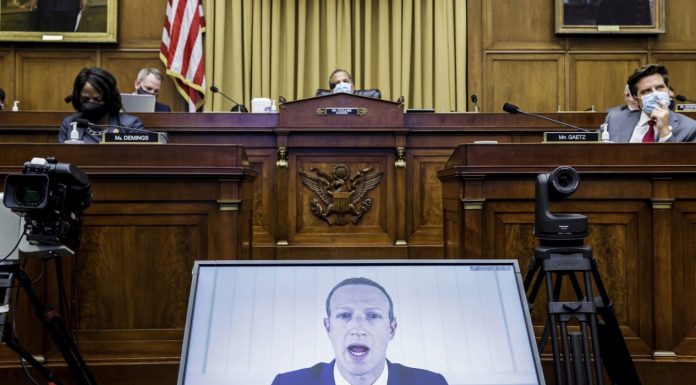(Headline USA) Fending off accusations of stifling competition and engaging in unfair practices such as systemic bias, four Big Tech CEOs attempted to defend their companies before Congress as a House panel capped its yearlong investigation of market dominance in the industry.
The powerful CEOs—Facebook’s Mark Zuckerberg, Amazon’s Jeff Bezos, Sundar Pichai of Google and Tim Cook of Apple—faced intense grilling by lawmakers on both sides of the aisle on Wednesday.
Frequently stalling, evading and deflecting, the executives—all of whom testified remotely via video conference—struggled to answer pointed questions about their business practices.
They also confronted a range of other concerns about alleged political bias, their effect on U.S. democracy and their role in China.
“I’ll just cut to the chase,” said ranking GOP committee member Jim Jordan of Ohio. “Big Tech’s out to get conservatives. That’s not a suspicion. That’s not a hunch. That’s a fact.”
Some provided firsthand evidence of politically motivated censorship on the heels of a report from Breitbart that Google’s suppression of search results had cut 99.7 percent of its traffic.
Among the toughest questions that members of the Democrat majority posed for Google and Amazon involved accusations that they used their dominant platforms to scoop up data about competitors in a way that gave them an unfair advantage.
Bezos said in his first testimony to Congress that he couldn’t guarantee that the company had not accessed seller data to make competing products, an allegation that the company and its executives have previously denied.
Regulators in the U.S. and Europe have scrutinized Amazon’s relationship with the businesses that sell on its site and whether the online shopping giant has been using data from the sellers to create its own private-label products.
“We have a policy against using seller specific data to aid our private label business,” Bezos said in a response to a question from Rep. Pramila Jayapal, D-Wash. “But I can’t guarantee to you that that policy hasn’t been violated.”
Pichai’s opening remarks touted Google’s value to mom-and-pop businesses in Bristol, Rhode Island and Pewaukee, Wisconsin, in the home districts of the antitrust panel’s Democratic chairman, Rhode Island Rep. David Cicilline, and its ranking Republican, Rep. James Sensenbrenner of Wisconsin.
But the Google executive struggled as Cicilline accused the company of leveraging its dominant search engine to steal ideas and information from other websites and manipulating its results to drive people to its own digital services to boost its profits.
Pichai repeatedly dodged Cicilline’s attacks by asserting that Google tries to provide the most helpful and relevant information to the hundreds of millions of people who use its search engine each day in an effort to keep them coming back instead of defecting to a rival service, such as Microsoft’s Bing.
In a tweet before the hearing, President Donald Trump challenged Congress to crack down on the companies, which he has accused, without evidence, of bias against him and conservatives in general.
“If Congress doesn’t bring fairness to Big Tech, which they should have done years ago, I will do it myself with Executive Orders,” Trump tweeted.
Trump previously issued an executive order to roll back long-held legal protections for online platforms afforded under the Communications Decency Act of the 1990s.
However, Congress has yet to pass meaningful legislation to address concerns over the companies’ partisan curation of user posts and other acts of election meddling, both overt and covert, while hiding behind their own left-leaning “community guidelines.”
In its bipartisan investigation, the Judiciary subcommittee collected testimony from mid-level executives of the four firms, competitors and legal experts, and pored over more than a million internal documents from the companies.
A key question: whether existing competition policies and century-old antitrust laws are adequate for overseeing the tech giants, or if new legislation and enforcement funding are needed.
Cicilline has called the four companies monopolies, although he says breaking them up should be a last resort.
While forced breakups may appear unlikely, the wide scrutiny of Big Tech points toward possible new restrictions on its power.
Cicilline also said that in the wake of the coronavirus pandemic, “these giants stand to profit” and become even more powerful as millions shift more of their work and commerce online.
The companies face legal and political offensives on multiplying fronts, from Congress, the Trump administration, federal and state regulators and European watchdogs. The Justice Department and the Federal Trade Commission have been investigating the four companies’ practices.
Adapted from reporting by the Associated Press

